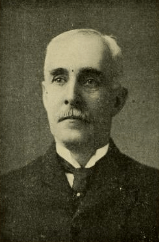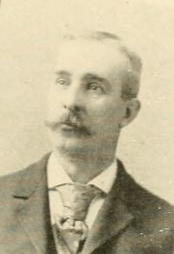George H. Newhall
| George H. Newhall | |
|---|---|
 | |
| 35th Mayor of Lynn, Massachusetts | |
| In office 1913–1917 | |
| Preceded by | William P. Connery, Sr. |
| Succeeded by | Walter H. Creamer |
| Member of the Massachusetts House of Representatives 12th Essex District | |
| In office 1906–1908 | |
| Succeeded by | Martin L. Quinn |
| Member of the Massachusetts House of Representatives 17th Essex District[1] | |
| In office 1894[2] – 1895[2] | |
| Personal details | |
| Born | Lynn, Massachusetts October 24, 1850[2] |
| Died | November 5, 1923 (aged 73)[3] |
| Political party | Republican[1][4] |
George H. Newhall (October 24, 1850 – November 5, 1923) was a Massachusetts politician who served in the Massachusetts House of Representatives, as a member of the Board of Aldermen and a member and President of the Common Council of Lynn, Massachusetts[2] and the as the 35th Mayor of Lynn.

Newhall was born in Lynn, Massachusetts on October 24, 1850. Newhall attended Wesleyan Academy in Wilbraham, Massachusetts.[2]
Business career
Newhall was involved in the manufacture of Shoes. He later became involved in the real estate and insurance business. He was also the President of the Lynn City Street Railway Company.[2]
Political career
Newhall was a member of the Lynn Common Council in 1886 to 1887, he was the President of the Common Council in 1887. From 1889 to 1890 and again from 1904 to 1905 he was a member of the Lynn Board of Aldermen.[2]
From 1913 to 1917 Newhall was the Mayor of Lynn, Massachusetts.
| Political offices | ||
|---|---|---|
| Preceded by William P. Connery, Sr. |
Mayor of Lynn, Massachusetts 1913 to 1917 |
Succeeded by Walter H. Creamer |
Notes
- ↑ 1.0 1.1 Bridgman, Arthur Milnor (1894), A Souvenir of Massachusetts Legislators, Volume III, Brockton, MA: A. M. Bridgman, p. 141.
- ↑ 2.0 2.1 2.2 2.3 2.4 2.5 2.6 Bridgman, Arthur Milnor (1908), A Souvenir of Massachusetts Legislators, Volume XVII, Stoughton, MA: A. M. Bridgman, p. 146.
- ↑ George H. Newhall's obituary
- ↑ Who's Who in State Politics, 1908, Boston, MA: Practical Politics, 1908, p. 264.